7 Shocking Reasons Dobermans Smell So Bad
Dobermans are known for their sleek, muscular appearance, and strong protective instincts. However, some Doberman owners may notice an unpleasant odor surrounding their beloved canine companion. Understanding the cause of this smell is essential in maintaining your dog’s health and keeping your home odor-free.
Bad smells in Dobermans may arise from various sources, such as poor hygiene, skin infections, or dental problems. Regular grooming and bathing play a crucial role in keeping your Doberman’s coat and skin clean and odor-free. Additionally, taking care of your dog’s teeth and gums can prevent any foul-smelling dental issues.

Knowing the possible reasons for your Doberman’s smell can help you solve the issue promptly, ensuring a more pleasant environment for you and your dog.
Dobermans, like any other breed, may develop some health issues that could contribute to an unpleasant odor. Be sure to monitor your dog for any changes in behavior or physical appearance that may indicate a medical condition. If you cannot pinpoint the cause of the smell, consulting a veterinarian is always the best course of action for the well-being of your furry friend.
Causes of Bad Smell
Infections
One reason your Doberman might smell bad is due to infections, especially in their ears. Dobermans are prone to ear issues, such as yeast infections, which can produce a foul odor. Make sure you regularly check your Doberman’s ears for any signs of discharge, redness, or swelling.
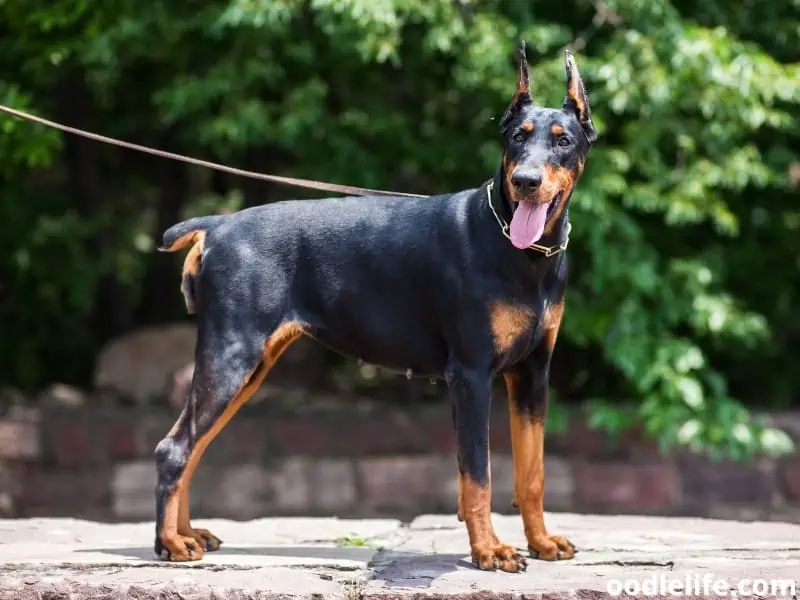
If you suspect an ear infection, consult your veterinarian for appropriate treatment.
Allergies
Allergies can also be behind that unpleasant odor. Some Dobermans may have allergies to certain foods or environmental factors, causing them to release excess oils on their skin and coat. These oils can mix with bacteria on their skin, leading to a musty smell.
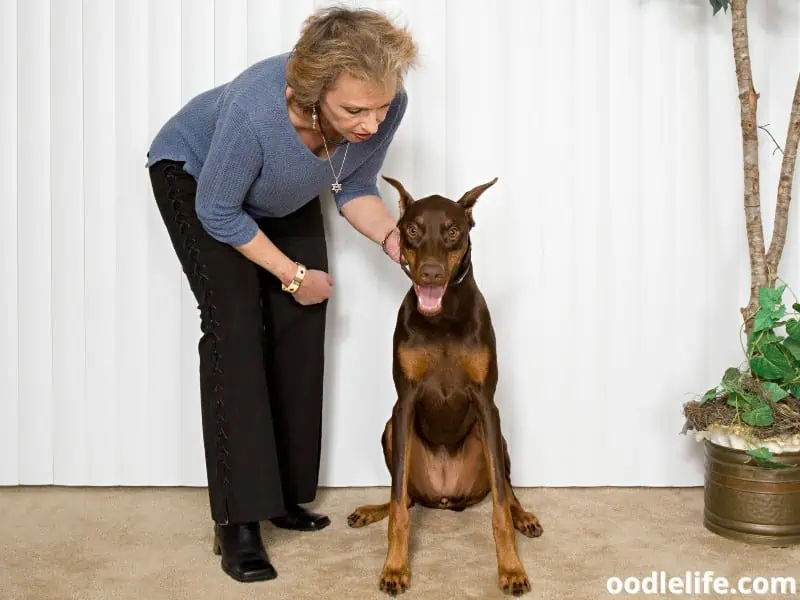
Identifying the allergens and adjusting your dog’s diet or environment accordingly can help reduce this smelly problem.
Diet
Your Doberman’s diet might be contributing to their bad smell, particularly if it consists of low-quality ingredients. Poor-quality diets might cause issues like bad breath and excess gas, which can contribute to odor. To minimize odor issues, feed your dog a high-quality diet that is specifically formulated for large breeds like Dobermans.
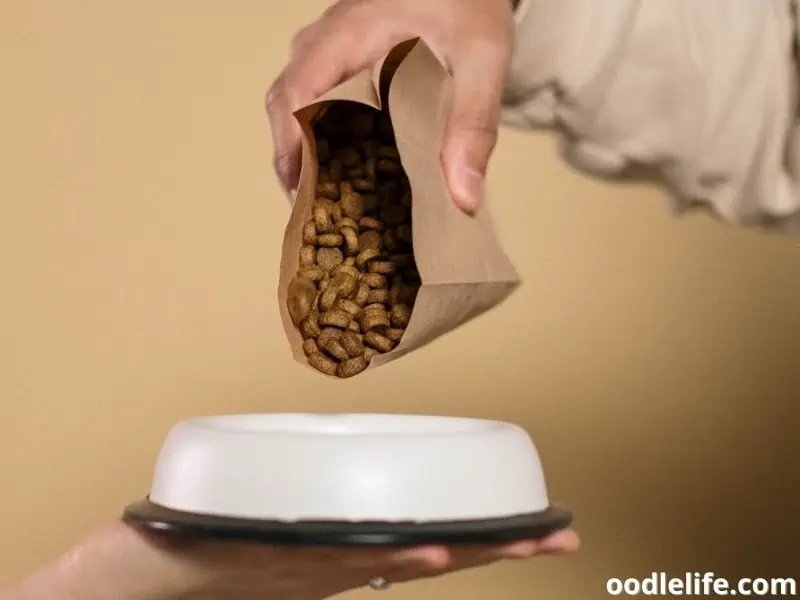
Hygiene
Proper hygiene is crucial for keeping your Doberman smelling fresh. Although Dobermans have a short coat, they still require regular baths to remove dirt and any unpleasant odors. Using a mild, dog-appropriate shampoo will help eliminate any lingering smells from their coat.
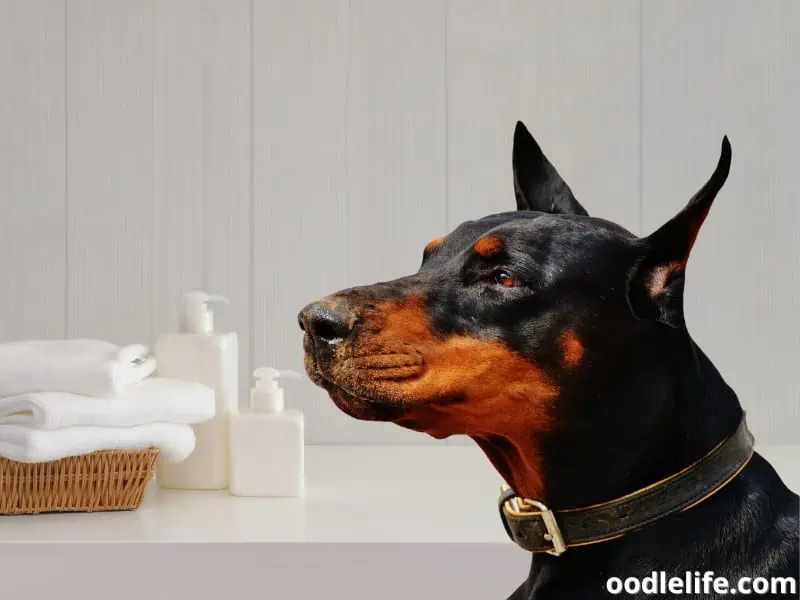
Do not forget to clean their paws, as dirt and bacteria trapped between their toes could also cause odors.
Grooming
Regular grooming can aid in maintaining your Doberman’s cleanliness and consequently reduce bad smells. Brushing your dog’s coat helps remove loose hairs and dirt, while also distributing their natural oils evenly. A well-groomed Doberman will not only look great, but it will smell better too.
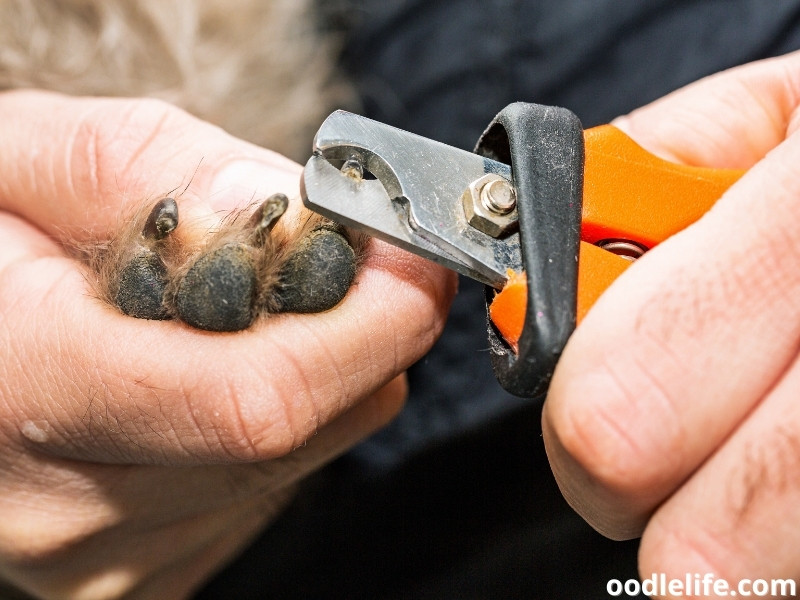
As part of your grooming routine, ensure your dog’s nails are trimmed and their teeth are cleaned to avoid any bad breath problems.
So next time you wonder why your Doberman smells so bad, consider these potential causes and take appropriate steps to keep your furry friend smelling fresh and clean.
Signs and Symptoms of Health Issues
One possible reason for your Doberman smelling bad could be due to an underlying health issue. Dogs, just like humans, can experience various health problems that may contribute to unpleasant smells. Let’s take a look at some common symptoms to watch for in your Doberman.
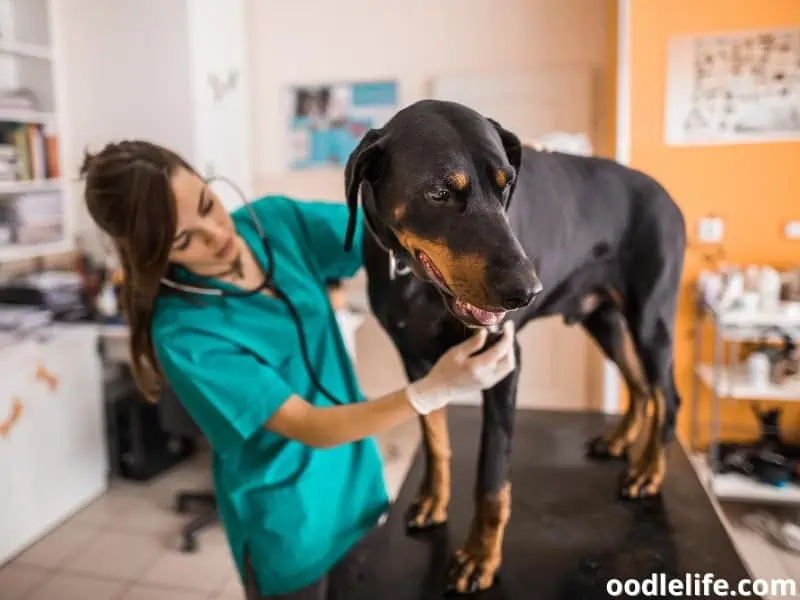
If you notice redness or swelling on your dog’s skin, it might indicate an infection or inflammation. Skin issues, such as dermatitis or hotspots, can cause your dog to develop a strong odor. In addition, these conditions often make your Doberman feel itchy, which leads to more scratching and potential damage to the skin.
Sometimes, the source of the unpleasant smell could be your dog’s mouth. Poor dental hygiene, infected gums, or even tooth decay can all lead to bad breath. You may find clues by checking your dog’s mouth for signs of bleeding, inflammation, or foul-smelling discharge.
Regular dental care and professional check-ups can help prevent these issues and keep your Doberman’s breath fresh.
Another potential issue could be related to your Doberman’s ears. Infections or yeast buildup in the ear canal can create an unpleasant smell and cause redness, itchiness, or swelling. Cleaning your dog’s ears on a regular basis, using appropriate ear-cleaning solutions, can help prevent these issues from arising.
Don’t forget about your Doberman’s paws! You might be surprised to learn that dogs can develop foot infections, which contribute to bad smells. Look for any signs of redness, swelling, or discharge between the toes, and consult your veterinarian if you suspect an infection.
In conclusion, keeping an eye out for these common signs and symptoms can help you identify potential health issues and take appropriate action before they become serious problems. Regular check-ups with your veterinarian and maintaining proper hygiene are essential to ensure your Doberman remains healthy, happy, and smelling great.
Grooming and Hygiene Solutions
Maintaining proper grooming and hygiene practices can significantly reduce the bad smell from your Doberman.

Proper Bathing
Giving your Doberman a regular bath is essential to keep them clean and odor-free. Use a mild, pH-balanced dog shampoo that is gentle on their skin. Be sure to rinse out all the shampoo thoroughly to avoid any residue build-up that may cause itching or odor.
Also, remember to clean their ears during the bath time as Dobermans can be prone to ear infections, which could contribute to unpleasant smells. Aim to give your Doberman a bath once every 4 to 6 weeks to maintain their hygiene while keeping their coat healthy.
Brushing and Shedding
Dobermans have a short coat, but regular brushing can help remove loose hair and minimize shedding, which can contribute to bad odors. Use a rubber curry brush or a grooming glove to remove any loose hair and distribute their natural skin oils throughout their coat. This will promote a healthy, shiny coat and help keep offensive odors at bay.
Brush your Doberman at least once a week, or more frequently if you notice excessive shedding.
Trimming Nails
Long, unkempt nails can not only be uncomfortable but also can trap dirt and bacteria, causing malodors to linger on your Doberman’s paws. Thus, keeping their nails trimmed is an essential part of grooming and hygiene maintenance. Invest in a good pair of dog nail clippers and trim their nails every 3 to 4 weeks, making sure not to cut too close to the quick to avoid any bleeding or discomfort.
Regular nail trims will help keep your Doberman’s paws clean, healthy, and odor-free. Pro-tip: after trimming their nails, you can also use a dog-safe paw balm to keep their paws moisturized and prevent cracking.
By following a consistent grooming and hygiene routine with proper bathing, brushing, and nail trimming, your Doberman’s coat will remain healthy, and those unpleasant odors will soon become a thing of the past.
Medical Treatment Options
Antibiotics and Antifungal Medications
If your Doberman is smelling particularly bad, it’s essential to consult with a vet, who can identify the underlying cause. Yeast infections, for example, can result in foul odors and require antifungal medications for treatment. Similarly, bacterial infections might need antibiotics to clear up the issue.
Your veterinarian will examine your Doberman thoroughly, taking into account their medical history, symptoms, and any lifestyle factors that could be contributing to the bad smell. Once they identify the root cause, they can prescribe the appropriate medication, whether it’s an antibiotic or an antifungal treatment.
Dealing with Oral Health Issues
Poor oral health is a common culprit behind bad-smelling dogs, and Dobermans are no exception. Gum disease, plaque buildup, and other dental problems can lead to bad breath and even more severe health issues if left untreated. To address your Doberman’s oral health, your vet might recommend the following:
- Regular teeth cleaning: Brushing your dog’s teeth with specialized canine toothpaste can help reduce plaque and tartar. Be consistent and make it part of your Doberman’s grooming routine.
- Professional dental cleanings: Schedule a dental exam and cleaning with your vet at least once a year. They will remove any stubborn plaque and evaluate your dog’s mouth for other issues.
- Diet: A balanced diet, including dental chews and dog food formulated for oral health, can help keep your Doberman’s mouth clean and healthy. Avoid feeding your dog table scraps or unapproved treats, as they may contribute to dental issues.
Remember, if your Doberman smells unusually bad, it’s always best to consult with a veterinarian to determine the cause and appropriate treatment options. Taking care of your dog’s health, both inside and out, will keep them smelling fresh and feeling their best.
Dietary Changes and Solutions
If your Doberman is smelling bad, it might be due to their diet. Dobermans, like all dogs, require specific nutrients to maintain good health and, ultimately, a pleasant odor. It’s possible that certain foods or ingredients in your dog’s diet are causing the stench.
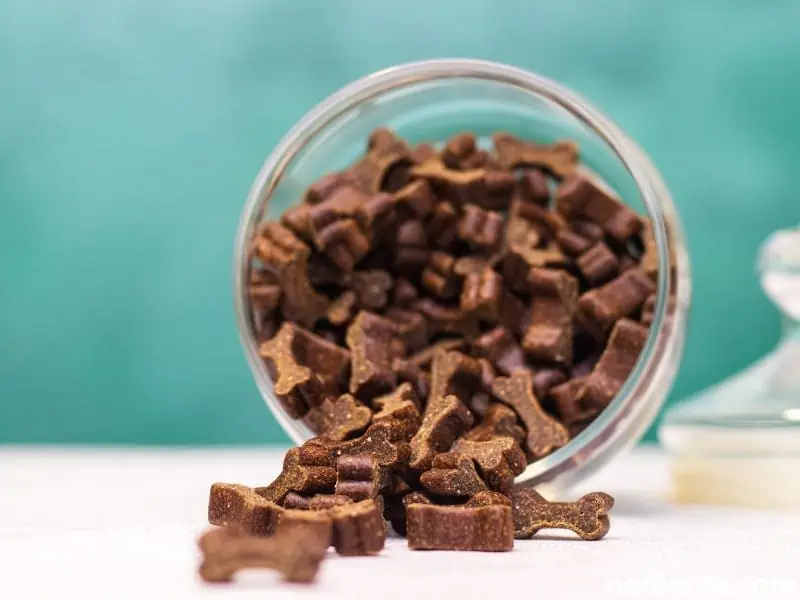
One way to tackle this issue is by assessing your Doberman’s current diet and identifying potential culprits. Start by taking a close look at the dog food they’re on. Look for ingredients that are known allergens, such as corn, soy, or wheat.
These ingredients might be causing digestion issues, which can lead to bad odors. If necessary, switch to a dog food that uses high-quality ingredients and avoids common allergens.
Another thing to consider is the addition of supplements to your Doberman’s diet. Probiotics, for instance, can promote a healthier gut balance, which may help reduce the smell. Omega-3 fatty acids found in fish oils can also contribute to better skin health, potentially decreasing odor-causing skin issues.
Frequency of feeding your dog can also play a role in their smell. Overfeeding can cause digestive difficulties, which might lead to bad odors. Feeding them smaller but more frequent meals can regulate their digestion, reducing any unpleasant smells.
Lastly, remember that not all treats are equal. Some low-quality treats might cause digestive distress or contain harmful additives, contributing to bad odors. Opt for high-quality, natural treats to reward your Doberman without affecting their odor negatively.
Through these dietary changes and solutions, you can help improve your Doberman’s smell and keep your home fresh. No promises that this will entirely eliminate Fido’s occasional “eau de dog,” but it’s a step in the right direction!
Maintaining a Clean Environment
Dobermans, like any other breed, can sometimes produce unpleasant odors. To maintain a clean environment and keep your Doberman smelling fresh, there are several steps you can take.

First, regularly clean your dog’s living space. Vacuuming your carpet and other flooring can remove pet hair and dander, which can contribute to bad smells. Additionally, washing your Doberman’s bedding and any soft toys frequently will help eliminate odors.
When it comes to grooming your Doberman, brushing them at least once a week can help to keep their coat shiny and healthy, as well as reduce any lingering smells. Make sure to give them a bath with a gentle pet shampoo when they get too dirty, not forgetting those sneaky spots behind their ears and in-between their paw pads.
Another essential factor in keeping your Doberman smelling fresh is their diet. Provide them with high-quality food to ensure they are receiving proper nutrients, which can have a positive impact on their coat and overall odor. Don’t forget to keep an eye on those delicious smelling treats, as they may be contributing to stinky breath or other unpleasant odors.
Keeping your dog’s teeth clean can also prevent bad breath, so make a habit of brushing their teeth or providing dental chews as part of their everyday routine.
As a pet owner, it’s important to pay attention to changes in your Doberman’s smell. If you notice any strong or unusual odors, it may be a sign of an underlying health issue. In such cases, it’s best to consult with a veterinarian to determine the cause and take appropriate action.
In conclusion, maintaining a clean environment involves a combination of regular cleaning, grooming, and proper nutrition. These efforts will contribute to keeping both your Doberman and your home smelling fresh and inviting.